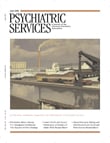Problem Gamblers' Interest in Self-Help Services
To the Editor: A difficulty encountered in efforts to help problem gamblers is that most gamblers never seek face-to-face treatment. Estimates of the proportion of gamblers with identifiable problems who ever seek treatment range from about 10% to 30% (
1,
2 ). In the study reported here, we sought to determine the level of interest in various forms of help among such gamblers.
A two-stage random-digit dialing telephone survey was conducted between 2006 and 2007 across Ontario, Canada. A total of 8,467 persons age 18 and older responded, for a response rate of 51.7%. All participants provided verbal informed consent. The study was approved by the research ethics board at the Centre for Addiction and Mental Health. Sample sizes are presented as unweighted values; percentages and statistical tests are based on weighted values.
As part of the survey, respondents who acknowledged spending more than $100 ever on gambling (N= 4,217) were administered the CLiP screener to identify those with potential gambling problems (
3 ). The three CLiP items for both lifetime and past-year gambling experiences were included. Respondents endorsing one or more lifetime CLiP items were also administered the National Opinion Research Center DSM Screen for Gambling Problems (NODS) (
4 ).
A total of 730 respondents had a score of 1 or more on the CLiP past-year gambling items, and this group constituted the study sample. Their mean±SD age was 45.3±14.8 years, and 377 (54%) were men. These respondents were asked whether they would be interested in four different types of services—a telephone call to help assess their gambling habits, a self-help book to help evaluate their gambling, a computerized summary comparing their gambling to that of other Canadians, and the same personalized summary available on the Internet.
Respondents were grouped into three categories on the basis of increasing severity of current gambling problem: those who scored 1 or more on past-year CLiP items but 0 on the NODS (N=500), those who met criteria as past-year risky gamblers (a NODS score of 1 or 2) (N=162), and those who were possible or probable past-year pathological gamblers (a NODS score of 3 or more) (N=68). There was a substantial positive relationship between each of the four types of help and the severity of the gambling problem (p<.001). Among the 68 possible or probable pathological gamblers, 25 (38%) were interested in a telephone call and about half (51% to 57%) were interested in each of the other three self-help options. Among the 500 respondents with a less severe gambling problem, interest in the alternate services ranged from 17% to 26%. [These and other survey results are shown in a table, which is available as an online supplement at ps.psychiatryonline.org.]
The results of this study suggest that one means of circumventing the reluctance of many gamblers to seek face-to-face treatment would be to expand the range of available self-help services. There have been several well-evaluated examples of brief, non-face-to-face interventions for problem gamblers (
5 ). The findings reported here indicate that many problem gamblers are interested in secondary prevention materials, particularly interventions that do not require direct contact with a treatment agency, such as computerized summaries and self-help books. Evaluation of efforts to make such self-help interventions more available would determine whether problem gamblers who say they are interested in such services would actually use them.

